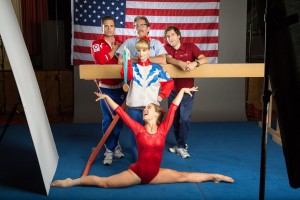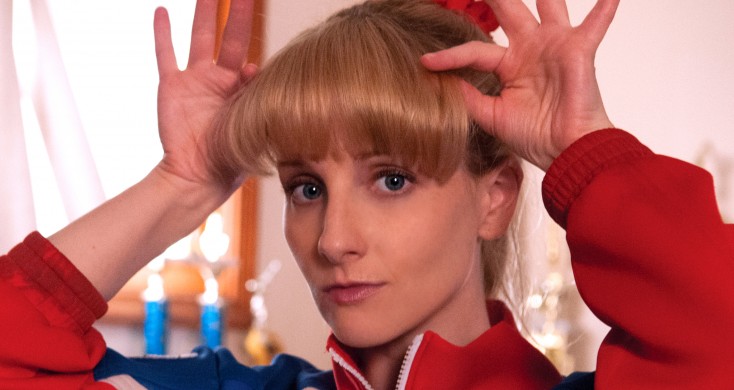
(top, left to right) Sebastian Stan, Gary Cole, Thomas MIddleditch, Melissa Rauch and Haley Lu Richardson star in THE BRONZE. ©Sony Pictures Classics. CR: Alicia Gbur.
By PETERSON GONZAGA
Front Row Features
HOLLYWOOD—It’s been a rollercoaster ride for Melissa Rauch and her co-writer/co-producer husband Winston Rauch on their film “The Bronze.” Although they were fortunate enough to sell their independently produced film at the Sundance Film Festival, they soon had a curveball thrown at them.
The couple had to deal with a bankrupt film company that had financed their picture, and they wondered if all their hard work would be for naught, until Sony Pictures stepped in and secured the rights to it, reviving the project through subsidiary Sony Pictures Classics taking on distribution rights.
Melissa Rauch delivers a performance that’s a departure from the likable Bernadette character she plays on TV’s “The Big Bang Theory.” As Hope in “The Bronze,” she’s arrogant, foul-mouthed and unlikeable. A washed up world-class gymnastics bronze medalist, Hope must come to terms with another local up-and-coming gymnastic star (Haley Lu Richardson) who threatens her long-standing celebrity status in Ohio. The comedy is directed by Bryan Buckley.
During a press junket, the comedic writer and actress explained the dynamics of her character and not giving up on playing the lead role herself.
Q: This is a departure from your Bernadette character on “The Big Bang Theory.” It seems Hope will tear you apart if you cross her. Do you see any similarities between these two characters in how they handle their aggression?
Rauch: There is a lot of aggression between the two of them. It’s something I didn’t realize while writing the script. It’s something I’ve been realizing in retrospect. Hope is so tough on the outside and under layers and layers of muck is sweetness. You have to chip away at it while Bernadette is sweet on the outside but she can pack a punch. On the inside, she’s this boiling tea kettle. So it’s really how they process their aggression and what they show on the outside. They really are working with the same level of aggression.
Q: How important was her hair because when she feathers her bangs, it’s time to get to work?
Rauch: Oh totally. That’s go time. Those bangs are special to me. I had those bangs way past the time they were socially acceptable. I wore them through the ‘90’s and my early college days. My freshman college roommate said, “It’s enough. Grow those out. It’s not helping you in any way.” But for Hope, it’s symbolic of her past and holding on to that legacy. It’s when she felt her most confident; when she peaked. Those bangs are where she holds her pride and self-esteem. I used it as a sort of tick because she doesn’t know how to properly express her vulnerability. She channels it into, “I’m feeling uncomfortable. I’m nervous. I’ll just play with my bangs.”
Q: So you premiered your film at Sundance and sold your film, which is phenomenal. How did you deal with the hiccups that happened in the past year to get the movie released?
Rauch: We were so thrilled to screen it at Sundance and then we were thrilled that it was bought there, which was a dream—both of those things. And then Sony with Stage Six, which was a division of Sony that had originally financed the movie and made it a reality, ended up getting back the distribution rights. I know there were dealings between the two of them before the bankruptcy, and then they were able to get the rights back. And then Sony Classics came on board to distribute it, which was beyond our wildest dreams. They’ve been so amazing.
When we wrote this script, I thought we’d shoot it on an iPhone and show it at my parents’ house, so it’s nice that Sony Classics is distributing the film and it’s going to open within a week. It’s so surreal. I can’t believe I’m sitting here talking about it. It’s very out of body.
Q: Were there ever moments you felt like you were going too far with this character?
Rauch: There were definitely points where we thought we could water it down here and there. We could put some sweet spots in it, but we wanted to stay true to this character’s journey and what she’s going through. She is so unlikeable because she’s not liking anything about herself. We’ve encountered people who aren’t the most pleasant people to be around. There is this pressure on camera to be likable. A man can be a little cold and mysterious while a woman is (considered) an ice queen or a *****. When I was living in New York, I would never get catcalls when I was walking down the street, but I’d get that, “Hey little girl, smile.”
It’s so much about our culture. It’s really a little bit meta in the fact that Hope has been told for so many years to be this perfect little girl and to smile to get endorsements. Now she’s rebelling against just that. With this character, we could have gone a little bit more palatable and made her a little bit more likable. But I’ve always been drawn to those (offbeat) characters in film like Cate Blanchett in “Blue Jasmine.” These raw, unapologetic characters that you’re get to see the struggle that they’re really going through. I’ve always loved movies like Bette Davis in “All About Eve,” (who was) super unapologetic. These are bitter and really dark women. There was a time when women weren’t getting those roles on film and TV and I think we’re making amazing strides. There are so many incredible roles that are happening with women playing these complex and layered characters. So it was important to us that we try and to that with Hope.
Q: Was writing a script for yourself a way for you to take charge of your career without having to be entirely dependant on an audition for your role?
Rauch: Yes. For sure. I’ve always have loved writing, just for the love of writing and getting a story out there as a writer. When Winston and I are writing, we have our writing hat and it’s not, “Okay. I’m writing this because I’m doing this for my career.” I’ve always loved writing separately. But with this one, knowing that it was something we were writing for me, I’ve always sort of used writing as a way to take control of my career. You’re always waiting for the next job. When I was in New York years ago and waiting tables and doing theater anywhere I could like the back of laundromats. When I wasn’t getting hired, we wrote a one-woman show for me in New York called, “The Mis-education of Jenna Bush,” that we directly did of the President’s daughter. It really was what got me out to Los Angeles and (where I landed) an agent. So I always used it as a sort of way to not wait on the industry.
Writing is a great way to way to write yourself out of a box. Once we wrote the script, there were a lot of producers interested in the script but they wanted to put another actress in the role that they could get a lot more money with a bigger name with someone who has proven box office success. So we had this moment where we thought, maybe we should do it with another actress. But, of course, we held on to it with a shoestring budget and did it independently. (Giving it to someone else) would have been something I would have regretted. There are other scripts that I’ve written where I said, “Okay. I can pass it on.” Most of those landed on a shelf or development **** somewhere. We knew we were going to Stallone this one (as the writer/actor did with “Rocky”) and hold on to it. I’m glad I did.





